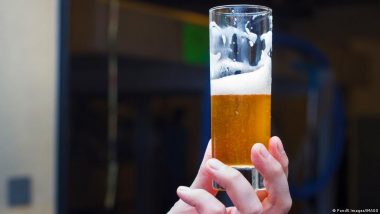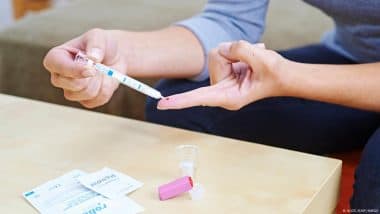New research suggests that drinking alcohol on a flight before taking a nap could be more harmful to your health than you may think.There are countless reasons why people drink alcohol on airplanes: For many, an alcoholic drink can help celebrate the start — or end — of a vacation. Some believe that they sleep better after a glass of wine. Others say alcohol helps to reduce flight jitters.
Also Read | German Study Shows 1 in 6 Get Antidepressant Withdrawal.
But a new paper published by researchers at the German Aerospace Center (DLR) and RWTH Aachen University suggests that drinks in the clouds can pose significant health risks, particularly to older passengers or those with pre-existing conditions.
Less oxygen, higher heart rate
During the flight, artificial pressure is created in the aircraft cabin. This does not correspond to the air pressure at sea level, but rather an altitude of around 2,500 meters. That's sort of like being at the peak of a mid-sized mountain.
The higher the altitude, the lower the air pressure. The lower the air pressure, the lower the oxygen saturation in the blood. A healthy oxygen saturation sits at around 90%, according to the study, published in the journal Thorax. When it drops below that, the muscles and organs stop getting the amount of oxygen they need, because the body is trying to supply the oxygen it has to the brain.
This lack of oxygen can cause dizziness or nausea. Sensitive passengers may start to breathe more deeply or rapidly than normal. Oxygen deficiency can also occur if alcohol causes heart rate to increase during sleep.
Poorer oxygen supply in drunk people
For the study, the 48 test subjects were divided into two groups: one that was examined in a sleep laboratory with normal ambient pressure, and another that was examined in an altitude chamber featuring air pressure akin to that of an airplane cabin.
Within each group, some test subjects drank alcohol before sleeping and others did not.
The study showed that the average heart rate of the drunk test subjects in the simulated aircraft cabin rose to 88 beats per minute while they slept. Their oxygen saturation fell to around 85 percent.
Their average heart rates were higher than the participants in the other [control] groups, and their oxygen saturation levels were lower.
The difference does not seem to be that serious at first glance. However, the negative effect was clearly observable even among the very young and healthy test subjects, the authors wrote.
For older or ailing people, low oxygen saturation and a significantly increased heart rate can be life-threatening.
Should alcohol be banned on airplanes?
The question of whether alcohol should be banned on flights has been debated for decades.
The study, which is certainly not the last of its kind, hardly allows for any direct conclusions — the test group was too small, too young and too healthy. In addition, the participants slept lying down.
Nevertheless, the researchers hope that the study will stimulate more research into the topic.
The results of the study indicate that alcohol consumption and sleeping while flying "represent a significant strain on the cardiac system, even in young and healthy people,” the authors wrote. And in older people or those with heart or lung diseases, symptoms could be even more serious.
The researchers advocate changing the existing regulations on airplanes and limiting alcohol consumption on board.
This article was translated from German.
Sources:
Effects of moderate alcohol consumption and hypobaric hypoxia: implications for passengers' sleep, oxygen saturation and heart rate on long-haul flights, 2024, https://thorax.bmj.com/content/early/2024/05/03/thorax-2023-220998
(The above story first appeared on LatestLY on Jun 07, 2024 08:30 PM IST. For more news and updates on politics, world, sports, entertainment and lifestyle, log on to our website latestly.com).













 Quickly
Quickly





















